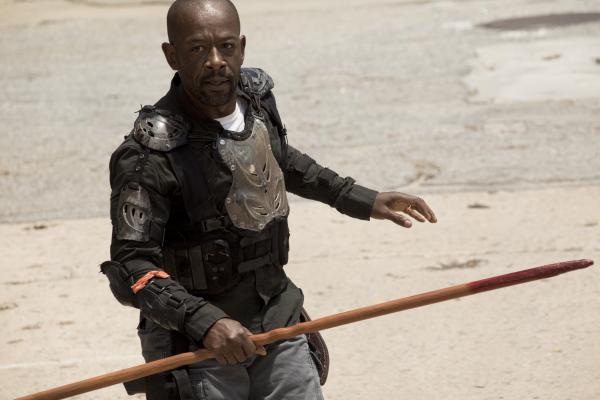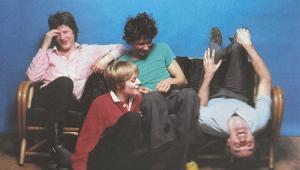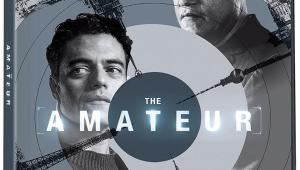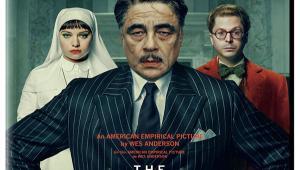Lennie James, Morgan Jones on The Walking Dead
While much continues to be made of the continual ante-upping of the show’s gore and shock-value content, TWD could never have lasted as long as it has without drawing from a wide swath of well-written and finely portrayed characters who continue to evolve from season to season. One of the show’s key survivors — who, in fact, has been part of the core group on and off since the October 2010 pilot episode — is the struggling pacifist Morgan Jones, as portrayed by the stellar, emotive British actor Lennie James (Jericho, Blade Runner 2049). “Morgan has always been a man of peace, but he’s not always been in control of his faculties,” James admits. “He’s not always been a man of sane thought, or action. But sometimes, he has — and steering that character evolution has been fascinating to be in the driver’s seat on.”
Morgan recently made the unprecedented leap from the main TWD franchise over to the fourth season of its companion show Fear The Walking Dead, a test James has met head-on — and quite eagerly at that. “This was an acting challenge,” James acknowledges. “It was something I felt we could explore with a character I’ve become very familiar with in an unfamiliar environment.”
I got on the line with James, 52, while he was on a short break from the FoTWD shooting schedule to discuss why Morgan endures, why he feels the show’s soundscapes are underrated, and how two other cult-favorite characters he’s portrayed over the years might fare if they met Morgan on the road in the zombie apocalypse.
Mike Mettler: Gravitas is one of the main characteristics you bring to most of the characters you play, especially Morgan. Do you feel you have a certain responsibility in giving a certain weight to a character like this one?
Lennie James: I think the character has that weight about him, yes. Maybe another actor would bring more giggles to it, but if you walked in Morgan’s shoes, that’s one of the things he has about him. That’s one of the things that’s helped him survive. That’s also one of the things that has driven him to his lowest lows, and what breaks him out of them is his inner strength, and the fact that he is somebody who is trying to walk with his better angel in this insane world he’s found himself in. So, if that comes across as gravitas, then so be it.
I’m just trying to connect the dots for what the picture ends up being. It isn’t entirely in my hands, but I am trying to make each step he takes, or each moment that he’s in, as real and as vivid as I possibly can.
Mettler: In a way, you’re also a peacekeeper, even though Morgan struggles with trying to corral his killer instinct. Is that fair to say?
James: Sometimes he has been a peacekeeper, yes. One of the reasons I enjoy still playing Morgan — I can’t tell you how surprised I am that I’m still associated with this particular character — and one of the things about this particular Walking Dead universe I like is that characters change. Characters evolve. They start in one place, and they come to other places.
It’s not like a procedural where you’re going in and doing pretty much the same thing every day. In this world I’ve been associated with for almost 10 years, things change. At times, Morgan’s been the peacekeeper, and at times he’s been more like the Tasmanian Devil, where Rick [Grimes, played by Andrew Lincoln] has pointed him in the direction with “kill” as the order, and he just moves forward and does it.
Mettler: As an actor, being able to evolve a character over a long period of time, rather than maybe play one beat or arc over the course of a 2-hour movie, must be something you relish being able to dive in and chew on.
James: It is, yeah — and I’ve tried my best to take advantage of that. But it’s not just me. Melissa [McBride’s] character, Carol, is another shining example of that, in the journey her character has gone on from the first season up to now — I mean, what a range she’s gotten to play.
Also, Andy [Lincoln], from where Rick started as the hometown sheriff to the leader of men and women he ends up being, has seen a massive change and transition. You know, I could go through a number of characters and cast in this world who have also gone through a massive transformation from who they were to who they are now.
Mettler: That’s so true. And on the physical side of things, you had to learn a very specific skill with your “stickmastery,” if I can put it that way. Do you feel you’re in the best physical shape you’ve been in as a result? [Morgan wields a wooden staff as a weapon with a certain precision, thanks to the Aikido martial arts training he learned mainly from the mysterious Eastman while he was in his captivity, as recounted in “Here’s Not Here,” Season 6, Episode 4.]
James: I think I’m kind of getting there with it. It’s one of those things, whether you like it or not, that you have to be aware of — that you have to be at a certain fitness level to do these shows. Or it will be written out or other allowances will be made, and other people will be doing the physical bits for you if you’re not careful. And because, on one level, part of your story is being told in the physicality of this show, I’m not someone who wants to hand this over to somebody else.
Am I as fit as I could be, or should be? No. But am I aware of the need to be at a certain level in order to do my job? Absolutely.
Mettler: I prefer watching the show on a big screen in the highest resolution possible on Blu-ray, and in full surround sound. Do you feel that’s the best way to experience a show like The Walking Dead, in that kind of setting?
James: I think yeah, absolutely, if you can! If you’re doing it in that particular way, you get to see what the job that everybody’s doing is. I mean, the soundscape of both The Walking Dead and Fear The Walking Dead is incredible — and sometimes I think the work that goes into creating that sort of soundscape goes unrecognized.
People watching and listening to the show on what we could perhaps call lesser devices like their phones, and stuff like that — they don’t necessarily get all the nuance. They don’t necessarily get all the layers that are being put down, and the same is true for the visual effects and the atmosphere. The amount of time the [production] guys spend taking out things like the basic traffic noise and the trains — they’re creating the silence that is our world now, and that takes a lot of effort. It’s not as simple as recording it, and just putting it on the telly.
Mettler: You’re absolutely right about that. I also like that, onscreen, we get to see the struggles Morgan goes through in your eyes, and in the way you grit your teeth. You’re really able to say without words what the character is going through.
James: I think that’s part of real people’s means of communication, despite the fact that our story is being told in a kind of made-up zombie apocalypse. Unless we find a reality to the characters, and unless we find a truth in their emotions and in their situations, it all goes for nothing.
So much of our communication as people, really, is non-vocal. We say a lot, but we communicate much more by what we don't say. Even now, as I’m having this conversation with you, the conversation going on in my head about what I will say and what I won’t say, and the words I will use and the words I won’t use — it’s like I’m having two conversations at the same time. I try to do that with my characters, and the characters I enjoy playing are characters who have an interesting internal dialogue, not just characters who just have “flashy” things to say.
So, for me as an actor, I am just as interested in what my character is not saying as I am in what they are saying.
Mettler: That comes across, just on your face alone. And now you’re also a pioneering TV character, since you’ve literally moved from “All Out War” [on TWD] to “All Out Fear” [on FoTWD], if I can put it that way. (James laughs heartily) The only other parallel I can think of is Richard Belzer taking his character, Detective John Munch, from Homicide: Life on the Street to Law & Order: Special Victims Unit, a.k.a. SVU.
James: Yeah, that’s the only other example I could come up with myself. It’s a slightly different journey, though he [Belzer] does a fantastic job on those two shows — and Homicide is one of my favorite television shows of all time. And Homicide was a slightly unusual procedural, because it has as much ethereal realization to it as it did procedural. SVU is very much more a procedural show — and though their journeys are quite similar, they’re not exactly the same.
And, yeah, that’s part of the reason I was up for the challenge, really — the fact that this was a unique opportunity and a unique challenge for me as an actor. In speaking to Scott [Gimple, executive producer], Andrew [Chambliss, showrunner], and Ian [Goldberg, showrunner] about it, I said if it wasn’t the right move for Morgan, there was no point in doing it. It just becomes a gimmick, and I wasn’t interested in being part of a gimmick. I would have rather seen having my time continue on The Walking Dead.
Mettler: On Fear, we’ve seen you mentoring the character Alicia Clark [played by Alycia Debnam-Carey] in your new setting, which has to be total manna for you as an actor.
James: Yes. He does, at the moment, have a connection with Alicia because he’s aware of her utter loss — she’s alone in the world, and he’s been there. He lost all the things that anchored him and defined him, much the same way she has. He sees that connection, and he wants to save her from some of the mistakes that he made.
Mettler: We have been able to see Morgan grow and learn over a long period of time. But I have to ask, if Morgan somehow came across your character Robert Hawkins from the show Jericho out there on the road, what would those two gentlemen say to each other? [Hawkins was the deep-cover covert-operations CIA agent James played on the two-season, 29-episode 2006–08 CBS post-apocalypse action drama, Jericho.]
James: (chuckles heartily) Oh, I think in that situation, there would be a lot that goes unsaid — and a lot of quiet investigation between the two men. I think on one level, they are fundamentally from different planets. Robert Hawkins was, as it turns out, an honest man who spends most of his life lying, keeping secrets, and not revealing his abilities or his knowledge. And Morgan is much more of an everyday guy who found himself in a fantastical situation, and has found out about himself in a way that Robert Hawkins knows in himself much better than Morgan knows himself. I think that’s one of their fundamental differences.
Mettler: Yeah. Now, if a third person walked into the picture — say, if Joe Geddes of Low Winter Sun happened to stroll into that conversation, where would he fit in? [James played compromised Detective Joe Geddes on the one-season, 10-episode 2013 AMC crime thriller, Low Winter Sun.]
James: I think Joe Geddes would find himself dead! (both laugh heartily) I don’t think Joe has the tools to either survive in the way Robert Hawkins does, or learn to grow and change in the way that Morgan does, so I worry about how Joe would fare in that environment.
Mettler: Joe always did seem to be reaching above his pay grade, so to speak.
James: Much of the time, he was thinking he knew stuff he didn’t know, and thinking he was capable of stuff he wasn’t really capable of. He really wasn’t even smart enough for his own game.
Mettler: Finally, I want to say that, while I don’t subscribe all that much to these kinds of things, I do appreciate you being a Libra, since we’re 2 days apart on the birthday scale. . .
James: Oh, there you go!
Mettler: And I do think the scales-balancing thing we Libras often practice somehow plays into what you’re doing as an actor.
James: I think it probably does! I don’t buy into it either, but I don’t know if it’s because I know it, and therefore I try and live up to it or it’s something that comes natural, but I do try to weigh things and meet success and failure as equal challenges. Maybe that’s what I get from being born in October.































































